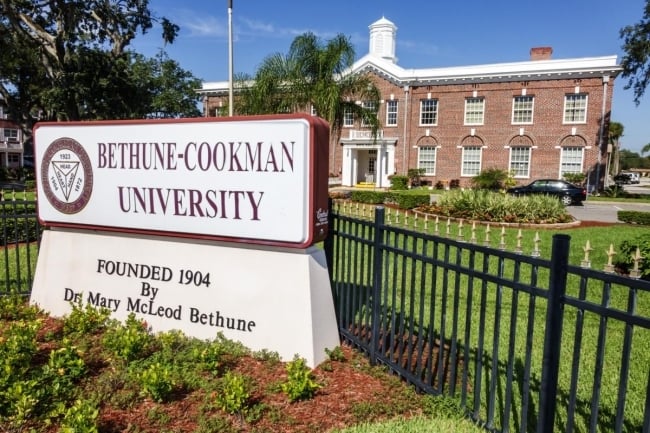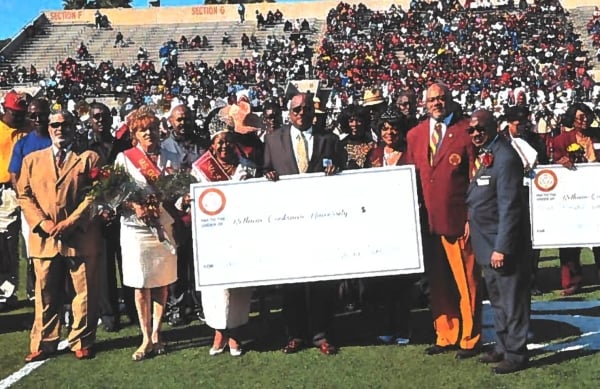You have /5 articles left.
Sign up for a free account or log in.

Bethune-Cookman University now has an in-house alumni association in place of its former organization.
Jeff Greenberg/Getty Images
Bethune-Cookman University and its former alumni association recently reached a settlement disbanding the association after the Florida institution sued the alumni group for trademark infringement and “deceptive and unfair trade practices,” among other claims.
The drawn-out legal battle came after the university’s Board of Trustees unanimously voted in 2021 to cut ties with the association, an independent nonprofit, and start its own in-house alumni organization. The Board of Trustees notified the association—which had been loudly and publicly critical of some university leadership decisions—that it could no longer use the university’s name or logo. University officials told The Daytona Beach News-Journal at the time that the shift was a matter of “best practices” for alumni relations.
But instead of shutting down, the association changed its name from the Bethune-Cookman University National Alumni Association to the Dr. Mary McLeod Bethune National Alumni Association, titling itself after the university’s founder, and continued to operate. The university then sued the association and its president, Johnny McCray Jr., in 2022, and remained locked in the legal fight up until last month when they reached the settlement.
An announcement from the university noted that, following the settlement, the association would be allowed a “brief period to wind down its affairs and operations” before it was “permanently dissolved” as a part of the settlement. All funds the organization raised for student scholarships will be distributed to students. (The university’s general counsel declined to comment for this story and referred Inside Higher Ed to the press release.)
“There is now one, and only one, Alumni Association for Bethune-Cookman University, which is THE BETHUNE-COOKMAN UNIVERSITY ALUMNI ASSOCIATION (the ‘B-CUAA’),” the announcement read. “The B-CUAA is the official, and the only, Alumni Association for alumni of Bethune-Cookman University. B-CU’s former alumni association, the MMBNAA, will be dissolved and effective immediately will no longer be accepting any donations of any kind.”
Alumni say they would have kept fighting, but their legal fees grew too costly.
“We just ran out of funds,” said Henry Dunn, a long-time member of the association who graduated from the institution in 1976. “… For me, it’s very disheartening to have to go through something like this.” He believes the university needs alumni’s donation dollars and “you can’t ask for alumni to help when you alienate them at the same time.”
Arthur Ray Brinson, president of the former alumni association from 2010 to 2014, said even if the association president and board chair butted heads, the infighting shouldn’t have gone this far, and previous disagreements between alumni and trustees have always been resolved. (Brinson also previously spent multiple stints on the Board of Trustees, 26 years total, and sued the university after it allegedly prematurely cut one of his terms short, which led to his reinstatement in 2018.)
“We’ve got these people who have been making sacrifices in their personal and professional lives for a number of years, and all of a sudden, you tell them now what they’ve been doing is no longer needed, no longer good enough,” he said. “It’s crazy.”
He reminisced that the first time he attended a chapter meeting in the 1980s, it was full of “old ladies—and I thought oh no no no, not for me.” Then one of the women apologized to the group for missing the previous meeting because she had been in the hospital.
Her dedication and passion for the association’s work made him feel like “I need to take a second look at this,” he said.
Mounting Tensions
The settlement thoroughly quashes any possibility of the former, almost century-old alumni association continuing.
The now defunct organization isn’t allowed to engage in fundraising, networking or social events using the term “alumni association,” the university’s colors of maroon and gold, McLeod Bethune’s “name, image, or likeness” or a black rose, a symbol associated with her, university logos or “any word, mark, term, symbol, logo, design, graphic image or visual representation of any kind that is confusingly similar to any of the foregoing.” The former association also has to surrender all social media accounts, websites and domain names it previously used to the university and close its bank accounts within a four-month “wind down period.”
The settlement also prohibits both parties from publicly criticizing each other. They’re barred from “publishing, republishing, disseminating, distributing, publicizing, propagating, authoring or communicating in any way any disparaging, derogatory, false or misleading communications” related to the other parties’ “respective businesses or operations, goods, services, personnel, principals, board, owners, members, shareholders, officers or employees.” They also have to remove any postings online that could be considered “critical, derogatory or disparaging” toward any other party or related to the litigation.

Alumni present a check from the former alumni association at a 2013 Homecoming event.
Arthur Ray Brinson
Tensions had been brewing between the former alumni association and trustees in recent years. Campus leaders faced a deluge of criticism in 2017 when a dorm initially projected to cost about $72 million was found to actually have a price tag of roughly $306 million over 40 years, The Daytona Beach News-Journal reported. A year later, the university sued former president Edison Jackson and other former administrators who oversaw the dorm deal alleging “illicit and fraudulent” conduct related to the dorm’s construction but quietly dropped the charges in 2022.
A loan from the U.S. Department of Education’s Historically Black Colleges and Universities (HBCU) Capital Financing Program enabled the university to refinance the loan agreement for the dorm through an agreement signed in 2021. University officials told Inside Higher Ed at the time that the loan required the university to prove its financial stability. But nonetheless, the series of events led alumni to demand more financial transparency from the private institution.
“You’re asking us to donate our money,” Dunn said. “Where is it going? What are you doing with it? That’s all we were asking, which we thought was a legitimate question.”
Alumni also raised concerns about the board when the university’s most recent permanent president, E. LaBrent Chrite, hired in 2019 and held in high esteem by many alumni, abruptly resigned in 2021 to become president of Bentley University in Massachusetts. Rumors spread that conflict with the board caused him to leave. Chrite released a video at the time acknowledging that he and the board had normal disagreements but ultimately praised their leadership and dedication.
The former alumni association took a vote of no confidence in the board that year.
Dunn said he’s “embarrassed” the university is now being led by its third interim president since Chrite’s departure. He said he plans to continue to donate scholarship money to individual students in the future, but he doesn’t feel comfortable donating to the university until a permanent president is in place. And he doesn’t plan to participate in the new in-house alumni organization.
“Right now, I’m taking a break,” he said.
‘Not an Anomaly’
These kinds of public fights between alumni and university leaders are hardly unique to Bethune-Cookman. And the university isn’t the first to be embroiled in such a legal battle.
The Board of Trustees at Goddard College similarly sent a cease-and-desist letter to its alumni association in 2021, accusing the group of trademark violations for using the college’s name, after it issued a vote of no confidence in the board and president. Baylor University cut ties with its alumni association in 2009 and sued the organization in 2014 to stop using the university’s name and limit its activities to providing scholarships. Alumni at the New Jersey Institute of Technology sued the institution in 2009 after they were told their association would be replaced with a new group.
Rodney T. Cohen, senior manager of university HBCU partnerships and initiatives at the University of Utah, said HBCU alumni groups have particularly storied histories, which can contribute to conflict.
He’s conducted research on HBCU alumni relations and noted that many HBCUs didn’t have the resources or infrastructure for sustained engagement with alumni when they were created, so many external volunteer alumni associations cropped up to fill the gap. He said they’ve continued to play an outsized role in fundraising, given that many HBCUs’ offices of institutional advancement are understaffed.
Some of these associations date back “to the 1800s, the 1920s, the 1940s,” he said. “As they became more robust, many of those HBCUs really depended on those associations to carry the water for them when it came to fundraising.”
Against that backdrop, the tensions Bethune-Cookman is experiencing are “not an anomaly,” he said.
Some associations have also proven to be powerful voices in campus politics, aiding in student protests and calling for the resignations of campus leaders.
Tyrone Couey, founding member and president of the National Historically Black Colleges and Universities Alumni Associations Foundation, added that HBCU alumni tend to be particularly “passionate” about the day-to-day operations of their alma maters as well, which can also fuel squabbles with campus leaders. His organization provides trainings to HBCU alumni association leaders and campus administrators to help them work effectively together to recruit students and fundraise.
Private HBCUs in particular “have a long, rich history,” skewing older than their public counterparts, which means alumni’s families have attended these institutions for “three, four, five generations” in some cases, he said.
Those dynamics contribute to alumni feeling “as though they should be running the school and, of course, they shouldn’t,” he added.
He noted that the vast majority of HBCUs have external alumni organizations as Bethune-Cookman did. There are some exceptions, including Howard University, Morehouse College and North Carolina A&T State University, which have in-house alumni groups.
Couey believes it can be “advantageous” for alumni groups to maintain their independence at a time when some states are passing laws that seek to limit diversity, equity and inclusion efforts.
These groups “can say things that obviously certain public universities cannot say, and they can be very supportive and strong advocates for the institution,” he said.
Cohen said there are also downsides to alumni groups’ independence. He said universities don’t always have access to alumni groups’ rolls of donors, which can prevent them from following up with those individual alumni to thank them and cultivate relationships that’ll ensure annual, long-term giving. Some external alumni groups are also more organized and professional than others, he added.
He believes it’s best for HBCUs to have “a robust, fully staffed office of alumni relations that is institutionally based,” even if relying on outside volunteer groups is less expensive.
Brinson said he expects alumni giving to drop at Bethune-Cookman now that the former association is gone. He wants to see the old association restored but doesn’t believe it’s going to happen.
“If it were my decision, I’d put things back how they were,” he said.





